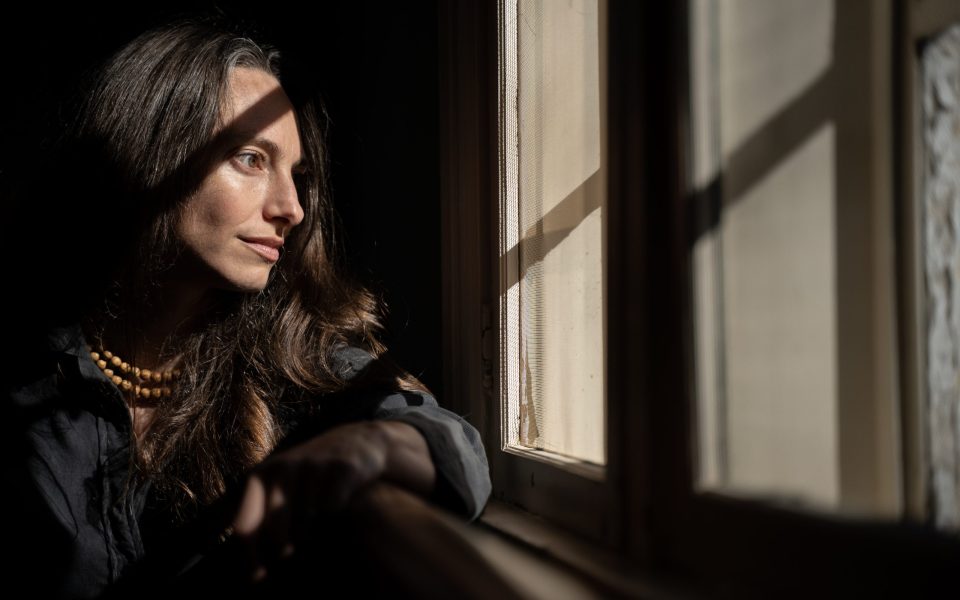Featured photo: Abigail Dowd at the Weymouth Center (photo by Todd Turner)
Abigail Dowd’s newlywed bliss was suddenly washed away by turbulent weather.
“We had literally planned our party for the day Hurricane Florence swept through,” she says.
In September 2018, Dowd and her now-husband Jason Duff intended to host a gathering at their Greensboro home for family and friends after being wed on the Capitoline Hill, one of the seven hills of Rome, a place where Dowd says she would always witness beautiful brides when she visited.
“That’s the only place I’ve ever been that made me want to be a bride and wear the big dress,” she says.
As the murky waters of Florence sat still in the yard, Hurricane Michael struck in October causing further damage to the couple’s home, forcing them to move in with Duff’s parents. Their house barely flaunted its renovations before flooding a third time nine months later. While Duff stayed behind to make repairs, Dowd navigated the spare bedrooms of friends in the city throughout 2019. During that time, she used her experiences of isolation and the unknown to compose 12 songs that would become her third album, Beautiful Day, set to be released on April 23.
The album was produced by Grammy-nominated mixer and engineer Jason Richmond, who Dowd had no relationship with prior to the collaboration.
“I’m not sure how he found me,” she says. “He reached out through Facebook and said, ‘I’d love to meet and talk next time you’re working on a new album.’”

She obliged, meeting Richmond in Mebane to discuss his offer over coffee. She gravitated towards his versatility, with a résumé boasting the names of gospel singer Shirley Caesar and Triad-based folk-rock band the Avett Brothers.
“I just knew this was somebody that I’d like to work with,” she says.
Richmond assembled a team of musicians to play the album’s instruments live, including Duff, who doubles as Dowd’s bandmate and plays the bass guitar and percussion to amplify her sound during live performances.
“It just evolved organically,” Dowd says. “He would hear places that he could add something fuller.”
For Beautiful Day, Duff stuck to bass guitar while Austin McCall handled drums and percussion. Scott Sawyer provided the thrilling sounds of electric guitar, and Alex McKinney dominated the dobro, a resonator acoustic guitar that produces sound through the guitar’s bridge using metal cones rather than the guitar’s sounding board. Joe McPhail played the keys of both the Wurlitzer electric piano and organ. Together, the instruments provide bluesy but stimulating backup to Dowd’s acoustic guitar and soft, yet powerful, raspy vocals.
The entire album was produced in February of last year in just five days. The task wasn’t easy, according to Dowd.
“They were long days,” she says while laughing, “but they were good days.”
The group recorded at the legendary Fidelitorium Recordings in Kernersville, a location Dowd describes as “otherworldly,” due to the positive energy she says she felt there while recording.
“It felt like I left some sort of sacred ceremonial ground when I walked away from the studio,” she says.
The Fidelitorium has been behind the recordings of REM, the dB’s and rock-indie band Rainbow Kitten Surprise among countless other notable acts.
Several months earlier, Dowd found herself sitting on a rock next to St. Vrain Creek outside of Boulder, Co. with her iPhone perched on her knee. As she listened to the sounds of the rushing water nearby, Dowd unintentionally created an instrumental track for the album.
“I just started picking my guitar, and the song, “St. Vrain,”most of that instrumental just sort of fell out of me,” she says.

Single notes played on an acoustic guitar exude a somber emotion at the beginning of the piece. About one minute into the song, the mood suddenly lifts and is intensified by accompanying guitars, possibly signifying Dowd’s desire for better days in the midst of being away from home. The song ends with a final strum of chords, the same chords that flow into the next song on the album, “River,”named after its co-writer, according to Dowd.
“The river helped write the song and I was just there to put it on tape,” she says.
Dowd recalls thinking of her great-grandmother while writing the song, creating a story with themes of resilience and rejuvenation.
“Free your heart and follow your soul,” she sings. “Heaven ain’t up, hell ain’t below.”
The thumping percussion creates a sense of motivation, strengthened by the song’s lyrics.
“What if Heaven ain’t waiting up above?/ What if it’s right here?/ If you don’t live your truth, Hell will come find you.”
Looking back, Dowd believes the floods were gifts of time, a chance to use the solitude to focus on her artistry.
“There were so many things in daily life that were just gone for me that opened up this huge swath of time to just sit with my guitar,” she says.
Just before the pandemic, Dowd and Duff settled into a new home in Greensboro. Lately she’s been devoting more time to preparing for the release of the album and doing livestreamed performances for fans. And even though the album was written years before the onset of Covid-19, Dowd says its message of resilience is evergreen.
“I have seen the darkness,” Dowd sings in the title track, “Beautiful Day.” “I’ve got shadows inside, but I hold on for the light. I have never known a sorrow that didn’t make me stronger. There’s never been a day that the sun don’t rise.”
Dowd describes how the song ties together the album’s underlying theme, to keep going despite how uncertain the circumstances may be.
“It’s really just a matter of getting up and living one day at a time,” she says, referencing another song on the album. “It’s become a mantra of mine.”
Beautiful Day will be released on April 23. Learn more about Abigail Dowd on her website at AbigailDowd.com.
Join the First Amendment Society, a membership that goes directly to funding TCB‘s newsroom.
We believe that reporting can save the world.
The TCB First Amendment Society recognizes the vital role of a free, unfettered press with a bundling of local experiences designed to build community, and unique engagements with our newsroom that will help you understand, and shape, local journalism’s critical role in uplifting the people in our cities.
All revenue goes directly into the newsroom as reporters’ salaries and freelance commissions.





Leave a Reply